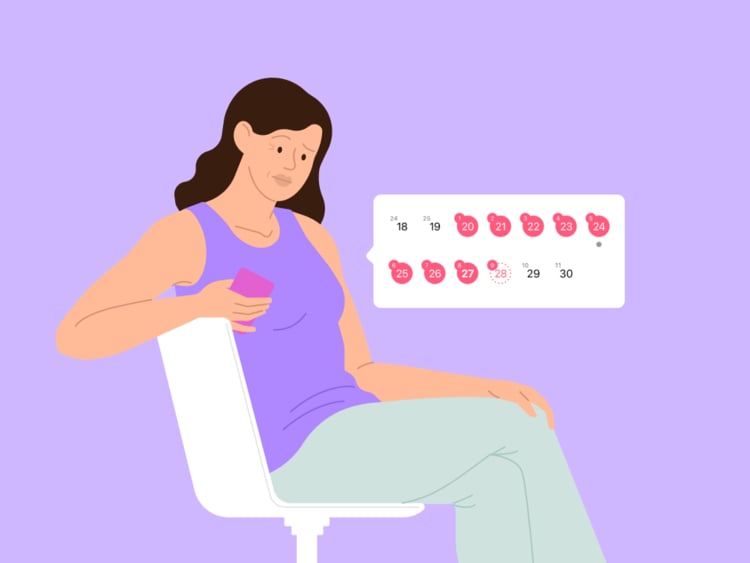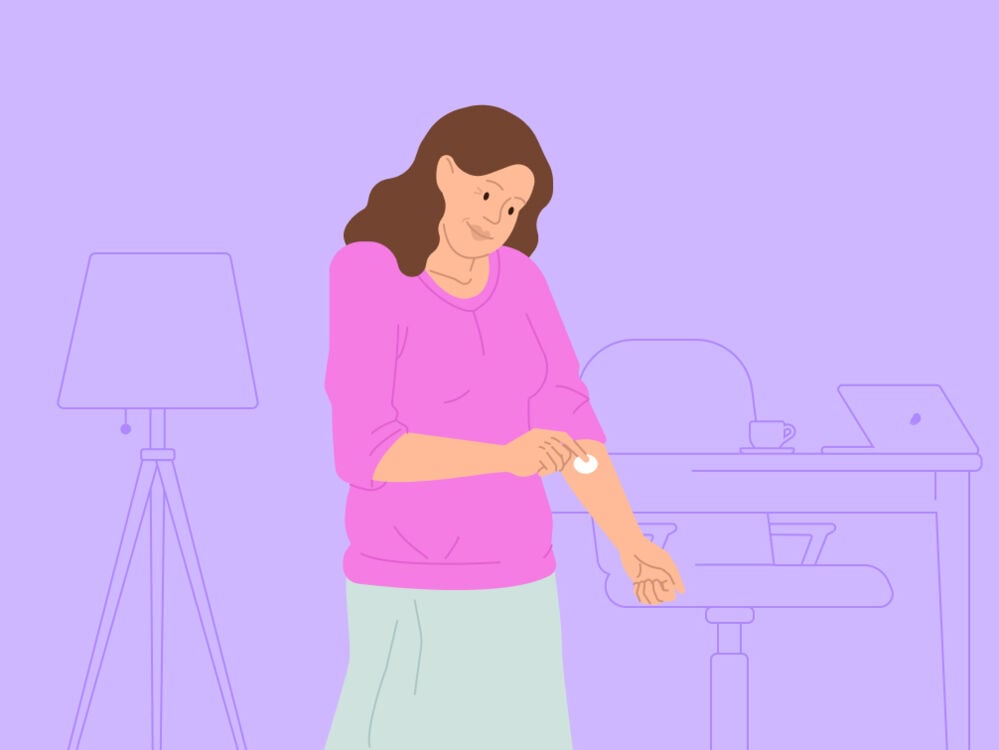Before your cycle stops completely, your periods become irregular, sometimes becoming longer or heavier. Find out what you might expect and when to see a doctor.
-
Tracking cycle
-
Getting pregnant
-
Pregnancy
-
Help Center
-
Flo for Partners
-
Anonymous Mode
-
Flo app reviews
-
Flo Premium New
-
Secret Chats New
-
Symptom Checker New
-
Your cycle
-
Health 360°
-
Getting pregnant
-
Pregnancy
-
Being a mom
-
LGBTQ+
-
Quizzes
-
Ovulation calculator
-
hCG calculator
-
Pregnancy test calculator
-
Menstrual cycle calculator
-
Period calculator
-
Implantation calculator
-
Pregnancy weeks to months calculator
-
Pregnancy due date calculator
-
IVF and FET due date calculator
-
Due date calculator by ultrasound
-
Medical Affairs
-
Science & Research
-
Pass It On Project New
-
Privacy Portal
-
Press Center
-
Flo Accuracy
-
Careers
-
Contact Us
How long is too long for a period during perimenopause?


Every piece of content at Flo Health adheres to the highest editorial standards for language, style, and medical accuracy. To learn what we do to deliver the best health and lifestyle insights to you, check out our content review principles.
Is your period extra long or particularly heavy this month with no obvious explanation? It’s normal for your menstrual cycle to fluctuate sometimes. Because we are all so different, our periods are too. Some of us have a consistently light flow throughout, while a quarter of us have so much blood loss each month that it’s described as heavy menstrual bleeding. Period length varies from person to person, too.
That said, most people bleed between two and seven days. And a cycle that lasts anywhere between 21 and 35 days is considered to be a normal length.
If your period does change occasionally, it’s usually nothing to worry about. Irregular periods can be caused by a bunch of things, including stress, switching birth control, or taking certain medicines. However, if you’ve been bleeding for longer than seven days and your period doesn’t show any signs of stopping, you might be wondering what’s going on.
If you’re between your late 30s and your 50s and your cycle-tracking app shows your periods have been extra long lately, it could be a symptom of perimenopause, signaling the start of your journey toward menopause.
Here, Dr. Allison K. Rodgers, reproductive endocrinologist, infertility specialist, obstetrician, and gynecologist, Fertility Centers of Illinois, US, shares everything you need to know about period changes during perimenopause. But if you have any questions or concerns about changes to your menstrual cycle or anything else, it’s always a good idea to reach out to a health care professional for advice.
Key takeaways
- Up to a quarter of women have irregular menstrual cycles, which can include shorter or longer than average periods.
- A change in your periods is often one of the first signs of perimenopause, although this can look very different for different people.
- Changing hormone levels are the reason why perimenopause can cause unpredictable bleeding patterns, such as long periods.
- Some birth control pills can regulate your periods in the early stages of perimenopause and may also help to reduce your symptoms.
- Hormone therapy (or HT, previously known as hormone replacement therapy or HRT) isn’t usually offered for irregular cycles alone, but if you have other perimenopause symptoms like hot flashes, then it could be a good option. Chat with your doctor to figure out what treatment could be right for you.
How long is a normal period?
If you’ve been having periods your whole adult life, you’ll probably know that your menstrual cycle is a natural process during which you bleed every month in preparation for a potential pregnancy. It starts on the first day of your period and ends the day before your next period starts.
Just like all aspects of our health, everyone’s cycle is slightly different — the length can vary from person to person and even from month to month. The average cycle length is about 28 days, but anywhere between 21 to 35 days is within the normal range, says Dr. Rodgers.
Typically, most people only bleed for the first five days of their cycle, but a period lasting anywhere between two and seven days is considered normal. You can expect to lose about 2 to 3 tbsp (60 ml) of blood during this time.
If you’re not sure when your last period was and you’re struggling to keep track of things, using a cycle-tracking app like Flo can help. You can also log any symptoms to better understand what’s normal for you.
Is it normal to have longer and heavier periods during perimenopause?
Menopause and the years leading up to it — which are known as perimenopause — often come with a variety of symptoms. While no two people have the exact same experience, a change in your periods is the main symptom of perimenopause.
So yes — it’s not uncommon for your periods to get longer and heavier during this time. But they may also get shorter or lighter, closer together at times, and then further apart. And in later perimenopause, they often disappear for months at a time. In short, any irregularity to your periods during this time of life could well be due to perimenopause. “Sometimes periods change during perimenopause. This can be due to hormonal fluctuations and possibly anovulatory cycles [cycles where you don’t ovulate],” explains Dr. Rodgers.
Are you unsure if you’re there yet? “Perimenopause is the transition into menopause [and one year afterward],” says Dr. Rodgers. Most commonly, perimenopause happens in your 40s, but it is known to start earlier or later than that for some people — anywhere between your mid-30s and 50s. It can take between four and eight years before your periods stop altogether — everyone’s different — but on average, perimenopause lasts about four years. “Menopause is the stop of menstrual cycles,” explains Dr. Rodgers, adding that you’ll know you’ve reached menopause for certain when you haven’t had a period for a whole year. From then on, you are postmenopausal.
It can be hard to keep track of irregular periods and other symptoms when you’re going through perimenopause, and that’s where a cycle-tracking app like Flo can help. In the app, you can log symptoms like brain fog and vaginal dryness alongside tracking your periods. Premium subscribers even get a cycle report each month, which you can take to your doctor to help explain what you’re going through.
Take a quiz
Find out what you can do with our Health Assistant
What causes longer-than-normal periods during perimenopause?
You might be more familiar with other signs of perimenopause, such as hot flashes, night sweats, and mood swings. Like these, longer periods and other changes to your cycle during the run-up to menopause are generally due to shifting hormone levels.
“Longer and heavier periods during perimenopause might be caused by [changes] in the hormones estrogen and progesterone,” explains Dr. Rodgers. “And possibly anovulatory cycles, which is when you skip ovulation, so an egg is not released from your ovary during a menstrual cycle.”
Other possible causes of longer-than-normal periods
Of course, your periods might be longer or different for reasons other than perimenopause, so it’s always worth getting checked out by your doctor to make sure you know what’s causing it. Some other causes of longer periods can include:
- Polyps: Small, noncancerous growths on your uterus can impact your periods. “Sometimes polyps can cause heavy bleeding,” says Dr. Rodgers.
- Fibroids: These are also noncancerous growths in your uterus which can differ in size, and some people don’t even know they have them. Sometimes, however, they can cause symptoms, including abnormal bleeding and pain in the pelvic area. You can use the Flo app’s Symptom Checker tool* to learn more about the common symptoms of fibroids and see how closely yours match.
- Blood-thinning medicines: “Some medicine that thins the blood can make bleeding heavier,” explains Dr. Rodgers.
- Using an intrauterine device (IUD): Heavy menstrual bleeding is a well-known side effect of using a copper IUD for birth control. However, if you have a hormonal IUD, this has been found to lessen bleeding, so it could be helpful for some people in perimenopause.
- Irregular ovulation: If you don’t ovulate in a cycle, then you don’t have a period. And if you go for several cycles without a period, it can mean you end up having a longer period with heavy bleeding when you eventually do menstruate. That’s because the body is trying to shed a thicker buildup of your uterine lining. Irregular ovulation can be caused by hormonal conditions like polycystic ovary syndrome (PCOS) or hypothyroidism, where the thyroid gland in your neck doesn’t produce enough thyroid hormone.
Whatever the reason for the change in your bleeding — whether it’s perimenopause, one of the causes listed above, or anything else — your doctor will want to figure it out. So make sure you schedule an appointment to be on the safe side.
How to cope with extended perimenopause periods
If changes to your periods or any other perimenopause symptoms are disrupting your life, don’t just put up with them. There are treatments available to help you feel more like yourself again.
The first thing you should do is reach out to your doctor for a checkup. “You should get evaluated by a medical professional if bleeding becomes suddenly heavier than it has been,” says Dr. Rodgers. “Often, medication can be helpful. It’s important to get to the root cause.”
Your doctor will ask you questions about your periods and general health. They might also perform a physical examination. After this, they’ll be able to suggest a variety of things that might help, including:
Hormonal contraception
Some hormonal contraception, including the combined oral contraceptive pill, the patch, the progestin-only pill, and the implant have been found to help regulate periods. Contraception that contains estrogen may ease other perimenopause symptoms like hot flashes, too. This is because they regulate your hormones, which are up and down during perimenopause.
Because we’re all different, and certain types of birth control may suit you better than others, it’s best to talk about your options with your doctor.
Hormone therapy (if you have other symptoms)
You might have heard of hormone therapy, one treatment option for perimenopause. It works by supplementing the key hormones you might be producing less of during perimenopause, usually estrogen and progesterone. “In general, hormones can cause the lining of the uterus to be thinner, so your bleeding is lighter,” says Dr. Rodgers, explaining how it can help prevent disrupted periods during perimenopause.
HT isn’t usually offered for long periods alone, but if you also have other perimenopause symptoms, such as hot flashes, vaginal dryness, and sleep problems, then it may be an option for you. As with all medications, hormone therapy isn’t suited to everyone, so you’ll need to chat with your doctor to figure out if it’s right for you.

A period-tracking app
It can be hard to keep track of irregular periods and other symptoms when you’re going through perimenopause, so a cycle-tracking app like Flo may help. In the app, you can log symptoms that can hit during perimenopause, like brain fog and vaginal dryness, alongside tracking your periods. This can help you keep a record of how long your periods have lasted and how long the gaps in between have been, so you feel confident that you’re armed with all the right information if you decide to see a doctor about it.
Regular exercise
Exercise may sometimes feel like the last thing you want to do when your period arrives, but keeping active has been proven to ease many tricky menstrual symptoms, including pain, cramping, and even mood swings. While it won’t take away long or heavy periods, anything that gets your heart pumping and strengthens your muscles has been found to help with perimenopause symptoms. If the gym isn’t for you, try gentle exercise such as yoga, aerobics, cycling, or walking.
What if your perimenopausal bleeding won’t stop?
If your period is going on for much longer than usual, don’t ignore it. “Bleeding that doesn’t stop can cause anemia and put you at risk for other health conditions,” says Dr. Rodgers. It’s always best to see a doctor. The best way for you to tackle it will depend on a number of factors, so discuss your options with them.
If you experience any of the following, make an appointment to see your doctor right away:
- Bleeding through a tampon or pad every one to two hours
- Passing blood clots larger than a bottle cap
- Bleeding longer than seven days each time you have your period
Frequently asked questions about the duration of perimenopause periods
Is it normal to bleed for weeks during perimenopause?
If your monthly bleed gets super heavy or lasts longer than seven days, you should make an urgent appointment with your doctor. It is not normal to bleed for several weeks, according to Dr. Rodgers, so it’s best to be seen so you can figure out the cause.
What’s the longest a period can last during perimenopause?
During perimenopause, your period might change in lots of ways, including getting shorter, heavier, lighter, or having long gaps in between. And while it’s not uncommon for periods to get longer than usual, too, during the run-up to menopause, you should always get any type of abnormal bleeding checked out by your doctor just in case.
What is your last period like in perimenopause?
Perimenopause, and then menopause, is different for everyone, so it’s hard to say exactly what your last period might be like. “Typically, the last few cycles can be light and unpredictable. Sometimes they can be totally normal,” says Dr. Rodgers. A good gauge that you may be nearing your last period is having a regular space of 60 days or more between periods, as this typically happens in later perimenopause.
*Not available in the United Kingdom or European Union/European Economic Area. Flo’s Symptom Checker is for informational purposes only. It is not a substitute for professional medical advice, diagnosis, or treatment of any kind.


Hey, I'm Anique
I started using Flo app to track my period and ovulation because we wanted to have a baby.


The Flo app helped me learn about my body and spot ovulation signs during our conception journey.


I vividly
remember the day
that we switched
Flo into
Pregnancy Mode — it was
such a special
moment.
Real stories, real results
Learn how the Flo app became an amazing cheerleader for us on our conception journey.
References
“Abnormal Uterine Bleeding.” The American College of Obstetricians and Gynecologists, Dec. 2021, www.acog.org/womens-health/faqs/abnormal-uterine-bleeding.
“A Guide to Birth Control in Your 40s and 50s.” Cleveland Clinic, 11 May 2023, health.clevelandclinic.org/birth-control-during-perimenopause.
“Combination Birth Control Pills.” Mayo Clinic, 13 Jan. 2023, www.mayoclinic.org/tests-procedures/combination-birth-control-pills/about/pac-20385282.
“Copper IUD (ParaGard).” Mayo Clinic, 1 Mar. 2022, www.mayoclinic.org/tests-procedures/paragard/about/pac-20391270.
Daley, Amanda. “The Role of Exercise in the Treatment of Menstrual Disorders: The Evidence.” The British Journal of General Practice, vol. 59, no. 561, 1 Apr. 2009, pp. 241–42, doi: 10.3399/bjgp09X420301.
Dehnavi, Zahra Mohebbi, et al. “The Effect of Aerobic Exercise on Primary Dysmenorrhea: A Clinical Trial Study.” Journal of Education and Health Promotion, vol. 7, no. 3, 10 Jan. 2018, doi:10.4103/jehp.jehp_79_17.
Delamater, Lara, and Nanette Santoro. “Management of the Perimenopause.” Clinical Obstetrics and Gynecology, vol. 61, no. 3, Sep. 2018, pp. 419–32, doi:10.1097/GRF.0000000000000389.
Eisenberg, Esther.“My Periods Have Changed. Is Menopause Around the Corner?” The American College of Obstetricians and Gynecologists, Oct. 2020, www.acog.org/womens-health/experts-and-stories/the-latest/my-periods-have-changed-is-menopause-around-the-corner.
Grandi, Giovanni, et al. “Contraception during Perimenopause: Practical Guidance.” International Journal of Women’s Health, vol. 14, 15 July 2022, pp. 913–29, doi:10.2147/IJWH.S288070.
“Heavy and Abnormal Periods.” The American College of Obstetricians and Gynecologists, Oct. 2020, www.acog.org/womens-health/faqs/heavy-and-abnormal-periods.
“Heavy Menstrual Bleeding.” The American College of Obstetricians and Gynecologists, May 2021, www.acog.org/womens-health/faqs/heavy-menstrual-bleeding.
“Hormonal IUD (Mirena).” Mayo Clinic, 11 Apr. 2024, www.mayoclinic.org/tests-procedures/mirena/about/pac-20391354.
“Hormone Therapy: Is It Right for You?” Mayo Clinic, 6 Dec. 2022, www.mayoclinic.org/diseases-conditions/menopause/in-depth/hormone-therapy/art-20046372.
“Irregular Periods.” Cleveland Clinic, my.clevelandclinic.org/health/diseases/14633-abnormal-menstruation-periods. Accessed 31 May 2024.
“Menopause.” Mayo Clinic, 7 Aug. 2024, www.mayoclinic.org/diseases-conditions/menopause/symptoms-causes/syc-20353397.
“Menstrual Cycle.” Cleveland Clinic, my.clevelandclinic.org/health/articles/10132-menstrual-cycle. Accessed 4 June 2024.
Miszko, Tanya A., and M. Elaine Cress. “A Lifetime of Fitness.” Clinics in Sports Medicine, vol. 19, no. 2, 1 Apr. 2000, pp. 215–32, www.sportsmed.theclinics.com/article/S0278-5919(05)70200-3/references.
“Overview: Heavy Periods.” Informedhealth.org, Institute for Quality and Efficiency in Health Care, 17 June 2021, www.ncbi.nlm.nih.gov/books/NBK279294/.
“Perimenopausal Bleeding and Bleeding after Menopause.” The American College of Obstetricians and Gynecologists, Oct. 2020, www.acog.org/womens-health/faqs/perimenopausal-bleeding-and-bleeding-after-menopause.
“Perimenopause.” Cleveland Clinic, my.clevelandclinic.org/health/diseases/21608-perimenopause. Accessed 2 Apr. 2024.
“Perimenopause.” Mayo Clinic, 25 May 2023, www.mayoclinic.org/diseases-conditions/perimenopause/symptoms-causes/syc-20354666.
“Polycystic Ovarian Syndrome (PCOS).” Cleveland Clinic, my.clevelandclinic.org/health/diseases/8316-polycystic-ovary-syndrome-pcos. Accessed 19 July 2022.
“Thyroid Disease.” Cleveland Clinic, my.clevelandclinic.org/health/diseases/8541-thyroid-disease. Accessed 28 Nov. 2024.
“Uterine Fibroids.” Mayo Clinic, 15 Sep. 2023, www.mayoclinic.org/diseases-conditions/uterine-fibroids/symptoms-causes/syc-20354288.
“Uterine Polyps.” Mayo Clinic, 15 Nov. 2022, www.mayoclinic.org/diseases-conditions/uterine-polyps/symptoms-causes/syc-20378709.
“What Are Menstrual Irregularities?” Eunice Kennedy Shriver National Institute of Child Health and Human Development, www.nichd.nih.gov/health/topics/menstruation/conditioninfo/irregularities. Accessed 31 May 2024.
Yu, Ying, et al. “Effect of Mirena Intrauterine Device on Endometrial Thickness, Quality of Life Score, and Curative Effect in Patients with Perimenopausal Abnormal Uterine Bleeding.” Computational and Mathematical Methods in Medicine, vol. 2022, 30 Sep. 2022, doi:10.1155/2022/5648918.
History of updates
Current version (06 December 2024)
Published (27 August 2019)
In this article

Track your perimenopause journey in the Flo app
-
Log symptoms and get tips to manage them
-
Learn what to expect with expert-led articles and videos
-
Connect with others who can relate to how you're feeling




